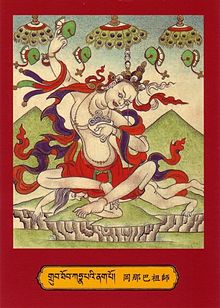Kanha (poet)
This article needs additional citations for verification. (April 2021) |
This article or section should specify the language of its non-English content, using {{lang}}, {{transl}} for transliterated languages, and {{IPA}} for phonetic transcriptions, with an appropriate ISO 639 code. Wikipedia's multilingual support templates may also be used. (March 2021) |

Kanha or Kanhapad or Kanhupa was one of the poets of Charjapad, the earliest known example of Assamese, Odia and Bengali literature. He was a tantric Buddhist and his poems in Charjyapad are written in a code, whereby every poem has a descriptive or narrative surface meaning but also encodes tantric Buddhist teachings. Some experts believe this was to conceal sacred knowledge from the uninitiated, while others hold that it was to avoid religious persecution.
In one of his poems, Kanhupa wrote:
Your hut stands outside the city
Oh, untouchable maid
The bald Brahmin passes sneaking close by
Oh, my maid, I would make you my companion
Kanha is the kapali, a yogi
He is naked and has no disgust
There is a lotus with sixty-four petals
Upon that the maid will climb with this poor self and dance.
The language of Kanhupa's poetry bears a very strong resemblance to modern Odia. For example,
Ekaso padumo chowshathi pakhudi
Tahin chadhi nachao dombi bapudi
Padumo (Padma:Lotus), Chaushathi (64), Pakhudi (petals) Tahin (there), Chadhi (climb/rise), nachao (to dance), Dombi (an Odia woman belonging to scheduled caste), Bapudi (a very colloquial Odia language to apply as 'poor fellow' )
or
Hali Dombi, Tote puchhami sadbhabe.
Isisi jasi dombi kahari nabe.
These passages do not require any translation into modern Odia language.
References[]
- ^ odia language
- Bengali male poets
- Indian poet stubs